
Leonid Ilyich Brezhnev was a Soviet politician who served as General Secretary of the Communist Party of the Soviet Union from 1964 until his death in 1982, and Chairman of the Presidium of the Supreme Soviet from 1960 to 1964 and again from 1977 to 1982. His 18-year term as General Secretary was second only to Joseph Stalin's in duration. To this day, the value of Brezhnev's tenure as General Secretary remains debated by historians. While his rule was characterized by political stability and significant foreign policy achievements, it was also marked by corruption, inefficiency, economic stagnation, and rapidly growing technological gaps with the West.
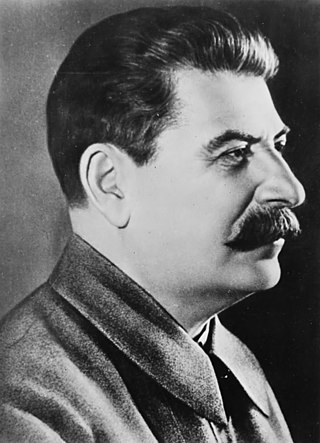
The General Secretary of the Central Committee of the Communist Party of the Soviet Union was the leader of the Communist Party of the Soviet Union (CPSU). From 1924 until the union's dissolution in 1991, the officeholder was the recognized leader of the Soviet Union. Officially, the General Secretary solely controlled the Communist Party directly. However, since the party had a monopoly on political power, the General Secretary de facto had executive control of the Soviet government. Because of the office's ability to direct both the foreign and domestic policies of the state and preeminence over the Soviet Communist Party, it was the de facto highest office of the Soviet Union.

The president of the Soviet Union, officially the president of the Union of Soviet Socialist Republics, abbreviated as president of the USSR, was the head of state of the Union of Soviet Socialist Republics from 15 March 1990 to 25 December 1991.
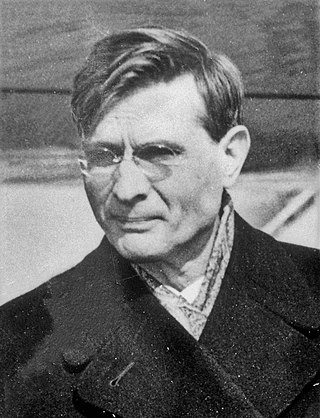
Mikhail Andreyevich Suslov was a Soviet statesman during the Cold War. He served as Second Secretary of the Communist Party of the Soviet Union from 1965, and as unofficial chief ideologue of the party until his death in 1982. Suslov was responsible for party democracy and power separation within the Communist Party. His hardline attitude resisting change made him one of the foremost orthodox communist Soviet leaders.
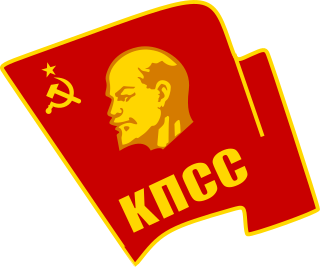
The Secretariat of the Central Committee of the Communist Party of the Soviet Union (CPSU) was responsible for managing and directing the day-to-day operations of the Communist Party of the Soviet Union, while the Politburo was charged with the policy-making aspects of the party. The Secretariat was a component agency of the party's Central Committee.
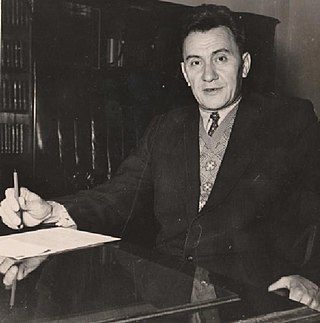
Dinmukhamed Akhmetuly "Dimash" Kunaev was a Kazakh Soviet communist politician who served as the First Secretary of the Communist Party of the Kazakh SSR.

Pyotr Mironovich Masherov was a Soviet partisan, statesman, and one of the leaders of the Belarusian resistance during World War II who governed the Byelorussian Soviet Socialist Republic as First Secretary of the Communist Party of Byelorussia from 1965 until his death in 1980. Under Masherov's rule, Belarus was transformed from an agrarian, undeveloped nation which had not yet recovered from the Second World War into an industrial powerhouse; Minsk, the capital and largest city of Belarus, became one of the fastest-growing cities on the planet. Masherov ruled until his sudden death in 1980, after his vehicle was hit by a potato truck.

The 26th Congress of the Communist Party of the Soviet Union opened on February 23, 1981, with a five-hour address by the General Secretary of the Communist Party and the chairman (president) of the Presidium of the Supreme Soviet Leonid Brezhnev. This was the last Congress for Brezhnev, who died in 1982. Brezhnev proposed another round of arms control talks. At a time when an aging Soviet leadership faced a decline in economic growth, severe food problems at home, grave uncertainties about its future relationship with the United States, and unsettling events in Poland, the congress ended its week of speeches by unanimously confirming the existing leadership. The congress elected the 26th Central Committee.
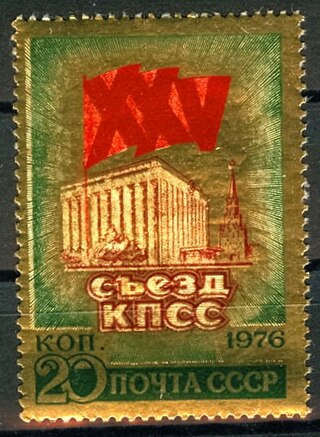
The 25th Congress of the Communist Party of the Soviet Union met in Moscow from February 24 to March 5, 1976. General Secretary Leonid Brezhnev greeted 4,998 Soviet delegates and representatives from 96 foreign countries. Among Communist-ruled nations, only the People's Republic of China and Albania did not send representatives. The congress itself produced few surprises, with the main emphasis placed on the stability of the political and economic situation and the prospects of continued success in the future. Brezhnev declared that the USSR would not invade or fight other countries, but also stated that he would support national liberation movements, despite détente. Little mention was made of fundamental problems facing the Soviet Union— the slowdown of the rate of economic growth, the low output of agriculture despite heavy investment. The only critical voices raised were those of foreign Communists. French Communist leader Georges Marchais boycotted the congress after criticizing the Soviet Union's suppression of dissidents.

The 27th Congress of the Communist Party of the Soviet Union was held from 25 February to 6 March 1986 in Moscow. This was the first congress presided over by Mikhail Gorbachev as General Secretary of the Central Committee of the CPSU. In accordance with the pattern set 20 years earlier by Leonid Brezhnev, the congress occurred five years after the previous CPSU Congress. Much had changed in those five years. Key figures of Soviet politics, Mikhail Suslov, Leonid Brezhnev, Yuri Andropov, Dmitriy Ustinov, and Konstantin Chernenko had died, and Mikhail Gorbachev had become General Secretary of the Party. For this reason the congress was widely anticipated, both at home and abroad, as an indicator of Gorbachev's new policies and directions. The congress was attended by 4993 delegates. It elected the Central Committee of the 27th term.

Fyodor Davydovich Kulakov was a Soviet statesman during the Cold War.

The Presidium of the 22nd Congress of the Communist Party of the Soviet Union (CPSU) was in session from 1961 to 1966. CPSU First Secretary Nikita Khrushchev chaired the Presidium from 1961 to 1964; Leonid Brezhnev succeeded him that year and chaired it until 1966. In contrast to full members, candidate members of the Presidium could not vote during Presidium sessions. It was normal that a full member of the Presidium had previously served as a candidate member, but this was not always the case. During the term 23 people held seats in the Presidium: 14 full members and 9 candidate members. One candidate member was promoted to full membership in the Presidium during the term. Not a single Presidium member died during this period while retaining office.

Yuri Leonidovich Brezhnev was a Soviet politician and the son of Soviet politician and longtime General Secretary Leonid Brezhnev and Viktoria Denisova.

On 10 November 1982, Leonid Ilyich Brezhnev, the third General Secretary of the Communist Party of the Soviet Union (CPSU) and the fifth leader of the Soviet Union, died at the age of 75, a month before his 76th birthday, after suffering heart failure following years of serious ailments. His death was officially acknowledged on 11 November simultaneously by Soviet radio and television. Brezhnev was given a state funeral after three full days of national mourning, then buried in an individual tomb on Red Square at the Kremlin Wall Necropolis. Yuri Andropov, Brezhnev's eventual successor as general secretary, was chairman of the committee in charge of managing Brezhnev's funeral, held on 15 November 1982, five days after his death.

Collective leadership, or collectivity of leadership, was considered the ideal form of governance in the Union of Soviet Socialist Republics (USSR) and other socialist states espousing communism. Its main task was to distribute powers and functions among the Politburo and the Central Committee of the Communist Party of the Soviet Union, as well as the Council of Ministers, to hinder any attempts to create a one-man dominance over the Soviet political system by a Soviet leader, such as that seen under Joseph Stalin's rule. On the national level, the heart of the collective leadership was officially the Central Committee of the Communist Party. Collective leadership was characterised by limiting the powers of the General Secretary and the Chairman of the Council of Ministers as related to other offices by enhancing the powers of collective bodies, such as the Politburo.

The Central Committee of the Communist Party of the Soviet Union was the executive leadership of the Communist Party of the Soviet Union, acting between sessions of Congress. According to party statutes, the committee directed all party and governmental activities. Its members were elected by the Party Congress.
The Nineteenth Congress of the Communist Party of the Soviet Union was held from 5 to 14 October 1952. It was the first party congress since before World War II and the last under Joseph Stalin's leadership. It was attended by many dignitaries from foreign Communist parties, including Liu Shaoqi from China. At this Congress, Stalin gave the last public speech of his life. The 19th Central Committee was elected at the congress.
The Moscow Summit of 1974 was a summit meeting between President Richard M. Nixon of the United States and General Secretary Leonid Brezhnev of the Communist Party of the Soviet Union. It was held June 28–1 July 1974. It featured the signing of the Threshold Test Ban Treaty (TTBT). The summit followed the Washington Summit the previous year as well as considerable progress in U.S.-Soviet relations made by Nixon in the previous two years. The visit was the final one of Nixon's presidency as he would give his resignation speech in August of that year.
The following lists events that happened during 1966 in the Union of Soviet Socialist Republics.
The following lists events that happened during 1980 in the Union of Soviet Socialist Republics.
















